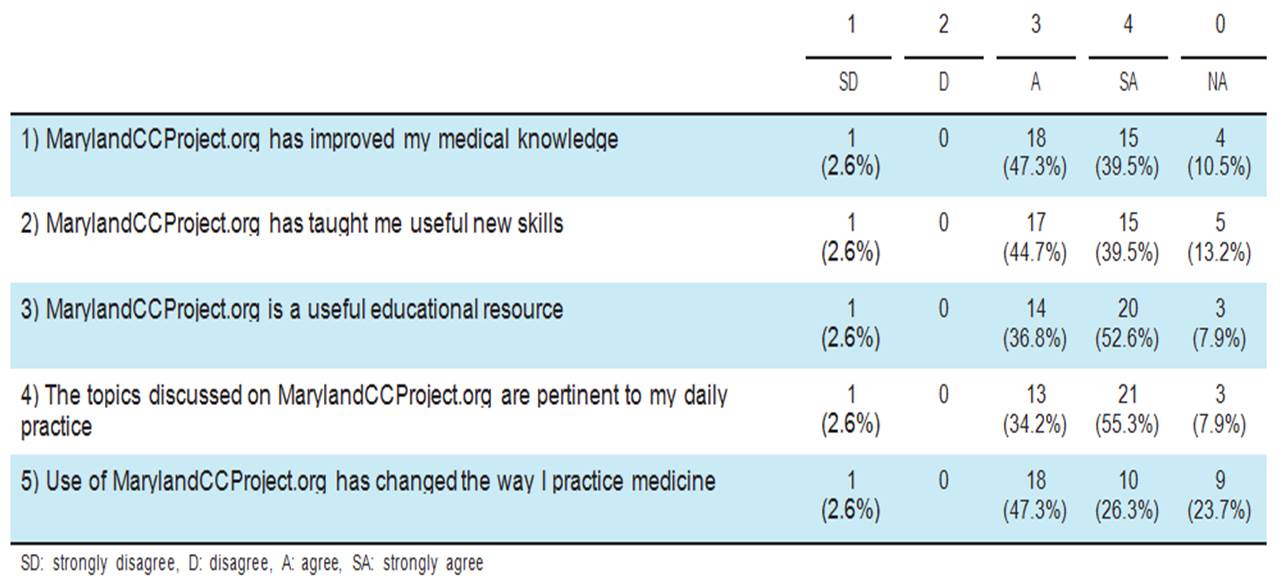University of Maryland
Baltimore, MD
Program Director: Michael McCurdy, MD
Type of Program: Critical Care Medicine
Abstract Authors: James Lantry III, MD, John Greenwood, MD, Nirav G. Shah, MD, Michael T. McCurdy, MD
RATIONALE
In spring of 2013, the University of Maryland Critical Care Medicine (CCM) fellowship directors created a weekly educational forum that would invite experts from our own hospital and around the country to further our fellows’ education in core competencies. The University of Maryland’s multidisciplinary critical care curriculum and training are the fellowship’s greatest strengths, so we attempted to integrate existing fellow lectures from the Pulmonary & Critical Care Medicine (PCCM), Anesthesia Critical Care Medicine (ACCM), Neurological Critical Care Medicine (NCCM), and Maryland Shock Trauma’s Surgical Critical Care (SCC) programs into a unified conference series. However, we encountered two major challenges in its creation:
1) ensuring conference attendance for all forty fellows in any of eight intensive care settings; and 2) the lack of a dedicated forum in which fellows could share cases and pertinent clinical information outside of teaching settings.
To address these hurdles, we established a fellow-run, online educational forum where fellows could participate in self-directed, asynchronous learning, review weekly lectures, share educational pearls, and reflect on their own clinical experiences. We hoped to establish an experiential learning opportunity for others to learn in parallel with the author.
METHODS
Starting July 2013, we utilized Camtasia Studio® 8 to record the University of Maryland Multi-Departmental Critical Care Core Curriculum Conference Series. We then created a free-access educational website (MarylandCCProject.org) to post these lectures. The site includes a videocast, lecture slides, iTunes podcasts, and a written summary of each core lecture. Additionally, we invited fellows to create a weekly “clinical pearl” based on interesting cases. Nine fellows (8 CCM and 1 PCCM) participated in authorship of 49 posts over the 6-month period. Two CCM fellows have served as website editors since its inception, ensuring the postings’ consistent format and educational value.
Six months after launching MarylandCCProject.org, we sent an online 10-question survey (Table 1) to 38 of the 40 critical care fellows (the two website editors were excluded from participation). The survey assessed the utilization, ease of use, and the content’s educational efficacy. Additionally, we asked the fellows to estimate the amount the website materials improved their overall knowledge, skills, and medical practice. Survey completion was at each fellow’s discretion, and all answers were anonymous.
RESULTS
All 38 fellows (i.e., 14 PCCM, 13 SCC, 9 CCM, 1 NCCM, and 1 ACCM) completed the survey. On average, each fellow accessed the site on 5 separate occasions (0 to 24), with all but 3 fellows accessing the site at least once (1 SCC and 2 PCCM). Of the 36 fellows using the site, 100% found the site easy to use and navigate, and 75% of fellows watched ≥1 webcasted lecture (27/38), with 24% preferring the webcasted lectures over live lectures (9/38). Almost all (97%; 33/34) felt that the website improved their medical knowledge, with 44% (15/34) strongly agreeing (Table 1). 97% of fellows learned new skills from the website (32/33) and 97% state the website changed the way they practice medicine (28/29).
CONCLUSIONS
Our survey demonstrates that a vast majority of our fellows use the website to supplement their education. Additionally, regardless of the training program, our fellows almost universally felt that the website expanded medical knowledge, taught new skills, and changed how they practice medicine. The next phase of the website will be the inclusion of board review materials. Additionally, off-site training programs in Haiti and the Dominican Republic use the website as the foundation for their critical care teaching. Notably, the website has received 27,493 “hits” from 107 countries in the past 6 months. We hope to increase international participation with postings that highlight interesting cases based in austere environments.
Table 1: MarylandCCProject.org Survey Results




